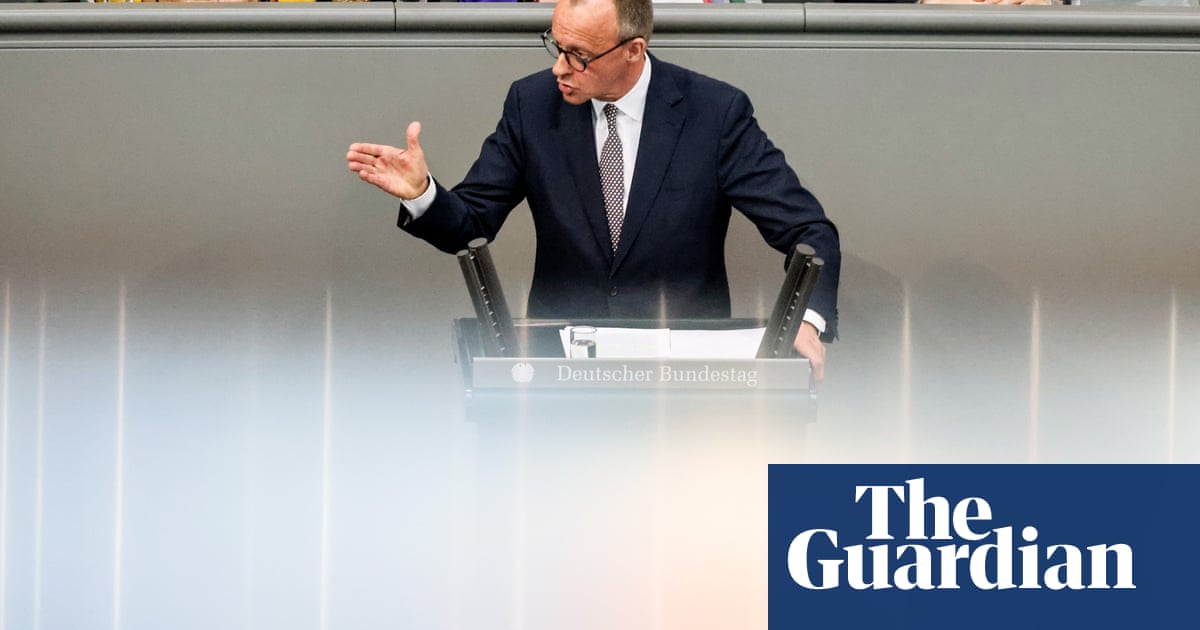Germany's Parliament Approves Historic Defense and Infrastructure Spending Plan
German lawmakers voted to lift debt limits for defense, creating a €500 billion fund, signaling a shift in fiscal policy amid rising security needs.
Subscribe to unlock this story
We really don't like cutting you off, but you've reached your monthly limit. At just $3/month or $30/year, subscriptions are how we keep this project going. Start your free 7-day trial today!
Get Started
Germany’s parliament has approved plans for a massive spending surge, throwing off decades of fiscal conservatism in hopes of reviving economic growth and scaling up military spending for a new era of European collective defence.
German parliament approves Merz’s spending boost
 Al Jazeera·1M·ReliableThis source consistently reports facts with minimal bias, demonstrating high-quality journalism and accuracy.Leans LeftThis outlet slightly leans left.
Al Jazeera·1M·ReliableThis source consistently reports facts with minimal bias, demonstrating high-quality journalism and accuracy.Leans LeftThis outlet slightly leans left.
Germany’s parliament approved plans for a massive spending surge on Tuesday, throwing off decades of fiscal conservatism in hopes of reviving economic growth and scaling up military spending for a new era of European collective defense.
Germany OKs huge boost in defense spending as Europe gears up for new era
 NBC News·1M·ReliableThis source consistently reports facts with minimal bias, demonstrating high-quality journalism and accuracy.CenterThis outlet is balanced or reflects centrist views.
NBC News·1M·ReliableThis source consistently reports facts with minimal bias, demonstrating high-quality journalism and accuracy.CenterThis outlet is balanced or reflects centrist views.
This vote is a historic move for traditionally debt-shy Germany, and could be hugely significant for Europe, as Russia's full-scale invasion of Ukraine grinds on, and after US President Donald Trump signalled an uncertain commitment to Nato and Europe's defence.
Germany votes for historic boost to defence and infrastructure spending
 BBC News·1M·ReliableThis source consistently reports facts with minimal bias, demonstrating high-quality journalism and accuracy.CenterThis outlet is balanced or reflects centrist views.
BBC News·1M·ReliableThis source consistently reports facts with minimal bias, demonstrating high-quality journalism and accuracy.CenterThis outlet is balanced or reflects centrist views.
However, they have also warned the package needs to be accompanied by widespread reforms, including boosting productive capacity, reducing bureaucracy, encouraging Germans to work longer and tackling high energy bills, which are prompting companies to leave Germany.
German MPs approve €500bn spending boost to counter ‘Putin’s war of aggression’
 The Guardian·1M·ReliableThis source consistently reports facts with minimal bias, demonstrating high-quality journalism and accuracy.Leans LeftThis outlet slightly leans left.
The Guardian·1M·ReliableThis source consistently reports facts with minimal bias, demonstrating high-quality journalism and accuracy.Leans LeftThis outlet slightly leans left.
Higher defense spending could also support growth, although it would add to pressure on government finances.
Germany Set to Embark on Defense Spending Spree
 Bloomberg·1M·ReliableThis source consistently reports facts with minimal bias, demonstrating high-quality journalism and accuracy.CenterThis outlet is balanced or reflects centrist views.
Bloomberg·1M·ReliableThis source consistently reports facts with minimal bias, demonstrating high-quality journalism and accuracy.CenterThis outlet is balanced or reflects centrist views.The plans amount to an about-turn for Merz, whose party had spoken out against running up new debt before the election without entirely closing the door to future changes to the “debt brake.”
Germany's likely next leader seeks approval for huge defense and infrastructure package
 Associated Press·1M·ReliableThis source consistently reports facts with minimal bias, demonstrating high-quality journalism and accuracy.CenterThis outlet is balanced or reflects centrist views.
Associated Press·1M·ReliableThis source consistently reports facts with minimal bias, demonstrating high-quality journalism and accuracy.CenterThis outlet is balanced or reflects centrist views.
The plans amount to an about-turn for Merz, whose party had spoken out against running up new debt before the election without entirely closing the door to future changes to the “debt brake.”
Germany's Likely Next Leader Seeks Approval for Huge Defense and Infrastructure Package
 Newsmax·1M·Mixed ReliableThis source has a mixed track record—sometimes accurate but also prone to bias, sensationalism, or incomplete reporting.RightThis outlet favors right-wing views.
Newsmax·1M·Mixed ReliableThis source has a mixed track record—sometimes accurate but also prone to bias, sensationalism, or incomplete reporting.RightThis outlet favors right-wing views.
Summary
Germany's parliament approved a historic defense and infrastructure funding initiative, allowing for €500 billion in spending and easing debt restrictions. This reflects a significant shift in Germany's fiscal conservatism, propelled by increasing military needs in light of Russia's aggression and shifting U.S. support. The legislation, passed by a two-thirds majority in the Bundestag, aims to bolster military readiness and revitalize infrastructure, with a focus on aiding Ukraine. Friedrich Merz, the likely new chancellor, stated this step could mark the beginning of a new European defense community. Approval from the Bundesrat is still required.
Perspectives
Friedrich Merz is seeking changes to Germany's borrowing rules to allow for substantial defense and infrastructure spending, aiming to boost the economy and enhance military capability.
The proposal includes a €500 billion fund for infrastructure, which underscores the urgency to address the country's long-neglected military and align with NATO commitments.
The legislative package has garnered support from the necessary coalition partners, signaling a shift towards more expansive government borrowing with confidence from financial markets.
FAQs
History
- 1M